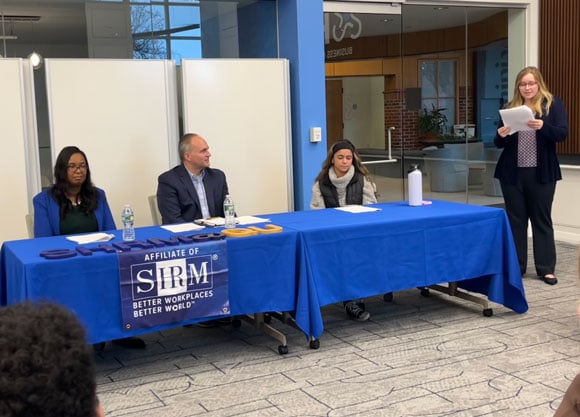
School of Business panel discusses diversity, inclusion and the impact of AI in the workplace
March 11, 2024

March 11, 2024

Panelists Britt-Marie Cole-Johnson and Frank Wittenauer shared their insights with undergraduate students on February 28 at Quinnipiac’s School of Business on the Mount Carmel Campus. The panel discussion in the Innovation Hub was hosted by student members of the Society for Human Resource Management (SHRM) at Quinnipiac.
SHRM invited the panelists for the club’s annual Diversity and Inclusion Day discussion, said SHRM president Amy Sherman ’24, a human resources (HR) management major.
“Each year, we pick a different topic that’s relevant, and we invite students from across the university and our club members to a discussion who can provide more education on diversity and inclusion within human resources,” said Sherman.
Both Cole-Johnson and Wittenauer said organizations using AI in the recruiting process need to ensure what they’re asking of AI involves the proper prompts and updated information. In many cases, organizations are using AI to generate job postings based on the company’s existing human relations information systems, Cole-Johnson explained.
“When AI is used as part of that to sift through data, it’s usually because HR has put in some inputs. That all works fine, as long as you are using appropriate keywords, as long as the job needs a bachelor's degree, and as long as all the inputs work together. Otherwise, that’s where the bias gets baked in,” Cole-Johnson said.
Implementing annual audits of job descriptions and updating them with input from organizational employees in the roles is something every HR department should be doing to ensure fairness in the recruitment process, said Cole-Johnson.
To mitigate bias in interviews, Cole-Johnson said her recommendation to companies is that the human element needs to be in the mix.
“We have been very clear that the interview processes need to involve human beings. I have very few clients that have tried to go completely digital on this front,” she said.
Some larger volume employers are being assisted by implementing video interviews with avatars asking questions, as well as built-in AI to assess an applicant’s recorded responses. The practice has its pitfalls, Cole-Johnson said.
“Imagine if someone has a speech impediment. That may show up as an issue during an interview and they may not get as high a score as someone else. Now, we have a bias against someone with a documented disability. And you could end up getting very different candidates based on that. Those are just some of the things I keep pushing to clients, to remind them that we still need some human input to control this process,” said Cole-Johnson.
The panel was moderated by SHRM vice president Claire Moreira ’24, a psychology major. Among questions for the panel, Moreira asked whether AI should be regarded with fear by employees, due to replacing certain positions, or seen as a bonus.
“A bonus, for the most part,” answered Wittenauer. “Will there be day-to-day work that will go away? Absolutely. Has there been day-to-day work that’s gone away over the last 100 years? Yes. We’ve evolved, and we’ll continue to evolve.”
Wittenauer said the current evolution is centered around robotic process automation (RBA). The job of HR leadership is to seek opportunities for RBA-displaced employees which will contribute to their growth and success, and the success of a company.
“These people know the business; we just need to evolve their skills. We need HR leaders to guide that process, and to let the folks in the C-suite know it’s valuable to the company,” said Wittenauer. “If the employees are open to it, and if they have the right attitude and aptitude, let’s lift them up so they can contribute more to the business.”
A student asked if companies replacing these types of tasks with technology may amount to fewer opportunities for internships and entry-level positions.
Cole-Johnson said she’s seen the strong lean-in to technology that’s occurred since the pandemic is changing HR entry-level work at many companies.
“I do think it’s creating a bit of a barrier. There’s almost no workplace to go into. Things like filing have been replaced, and answering FAQs. We’re seeing bots answering, whereas maybe the intern would have taken those questions,” said Cole-Johnson. “So you will come in at a level that’s more challenging; and maybe a little more disconcerting, until you really get comfortable in that first HR role.”
Sherman asked the panelists what advice they have for young professionals entering the workforce today.
“Learn as much as you can, try as many things as you can. Fail, fast. And then, you pick up the pieces and learn from it,’” said Wittenauer.
For students entering the HR field in the age of AI and continuing digital transformation, Cole-Johnson recommended becoming more familiar with the basics of information technology (IT).
“Oftentimes, when these pieces of tech get implemented, you all are the ‘knowledge experts’ on the HR side; and you have to be able to talk to the IT people. That could be a challenge because you don’t have shared skill sets. If you have a little bit of their skill set, it could be helpful,” said Cole-Johnson.
Quinnipiac Today is your source for what's happening throughout #BobcatNation. Sign up for our weekly email newsletter to be among the first to know about news, events and members of our Bobcat family who are making a positive difference in our world.
Sign Up Now